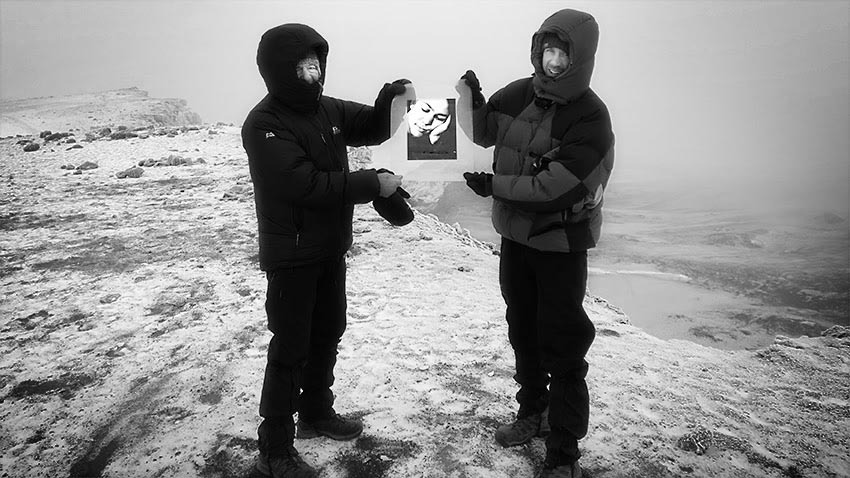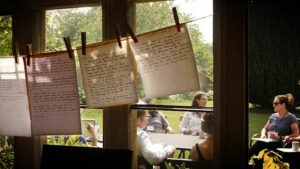“Pole, pole” – pronounced polay, polay, it means ‘slowly slowly’ in Swahili and it’s the best advice should you attempt to climb Africa’s highest mountain. In many ways, since our son Joshua died in 2011, life has been lived at this speed – slowed down, sometimes almost to a halt.
Before grief, I had not taken much notice of time or our relationship to time and the way it governs our lives – slow or fast, time seemed to be a constant. Whatever life meant at any one instant, the adrenaline rush of a sky dive or the monotony of being stuck in a traffic jam, seconds and minutes would tick by unseen and uncaring, regular as clockwork and dependable – you could count on time in ways no other faith could.
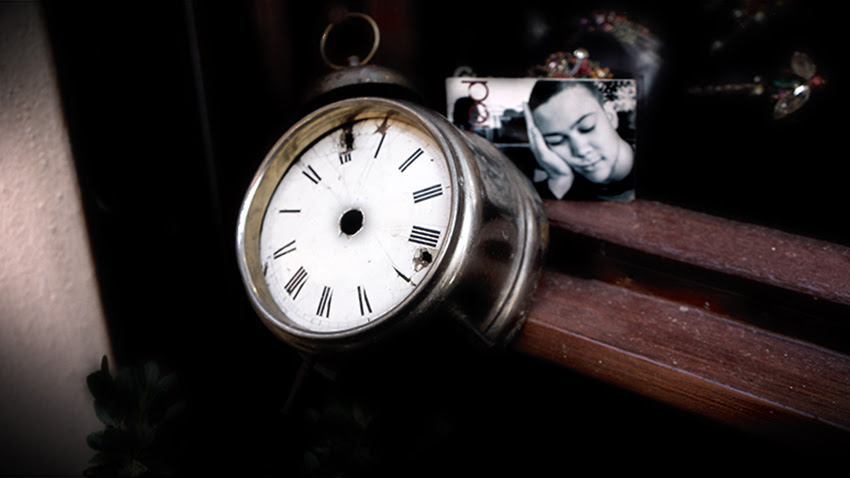
It’s been three weeks now since my son Joe (Josh’s older brother) and I, along with 8 other members of the Good Grief Challenge successfully reached the summit of Mount Kilimanjaro. With 73 kilometres of rugged terrain and nearly 4000 metres of elevation gain, this had been a gruelling six-day trek marked by unpredictable weather, rocky trails and freezing temperatures.
One step at a time became our mantra. In the ever-thinning air each step itself felt like a small victory. But looking back now it all feels timeless. Maybe that’s the way memory works, bygone events while recalled in the present, are nevertheless contained in one time zone called ‘the past’.

But maybe that’s the way mountains work too. Our perception of them as timeless and unchanging at odds with the reality of their being constantly on the move. If we had a sense of time stopped when news of Josh’s death crashed into our lives, I’m not sure if we re-entered the same temporal world we had taken for granted just moments before.
To ask the question ‘where is he now?’, while reasoned, logical, necessary and predictable, is ultimately pointless given that in death there is no time. How many years have now passed, years in which the boy to whom we gave life, no longer has that life? To count them is to confront a basic flaw in our understanding of the passage of time.
If Joshua is still our son, not ‘was’ but ‘is’, then the closest we can come to living the paradox of a life lived outside time, or what Denise Riley calls ‘time lived, without its flow’, is perhaps a time in slow motion – pole, pole.
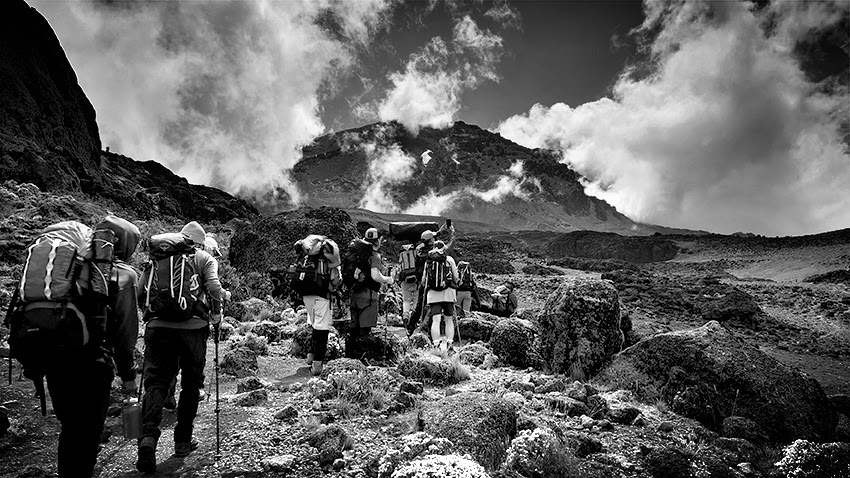
At 5895 metres above sea level, the summit of Kilimanjaro is at an elevation where temperatures will drop to -15°C, oxygen levels fall to less than 50% and most people will suffer from some of the symptoms of AMS (acute mountain sickness) – headaches, nausea, vomiting, dizziness and insomnia. The way to counteract this is through a gradual acclimatisation – on most days we climbed high and slept low.


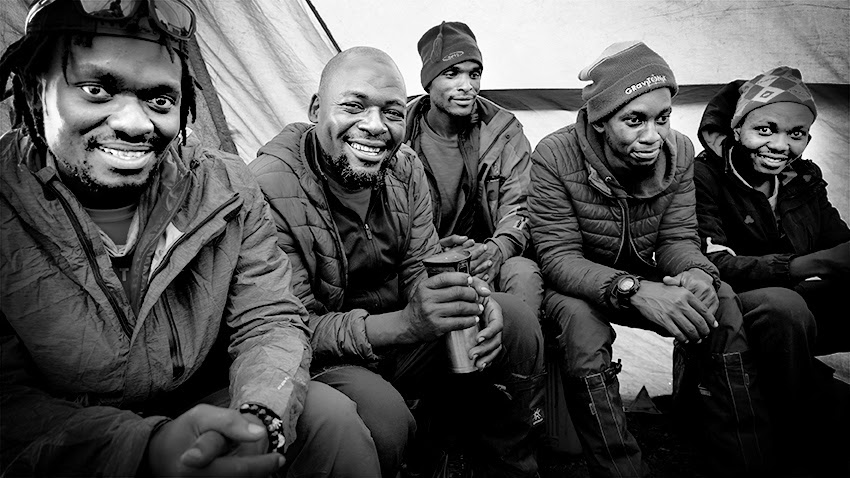
Some of our guides led by Abdallah Msuya on the far left
At all times though, we walked at a snail’s pace – ‘pole, pole’…. slowly, methodical, mesmeric, one step at a time. Our guides would set the pace, and we would follow, mostly inline, eyes fixed on the heels of the person in front. The sense of time slowed down was unavoidable. But comforting. Perhaps for one of the very few times when my physical being was perfectly in tune with my mental state, with my grief.
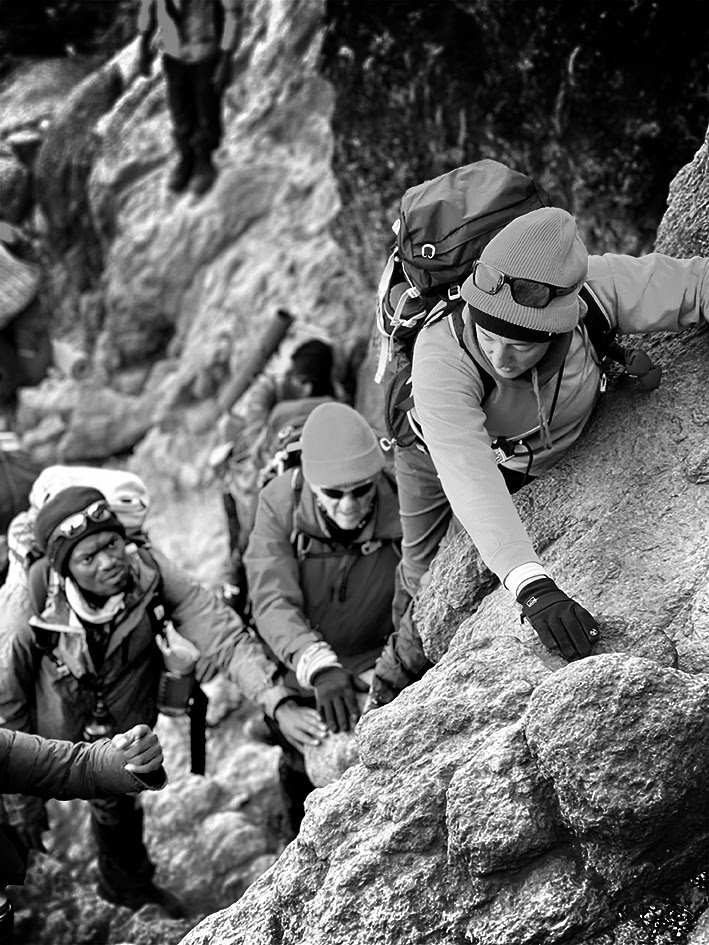
The Barranco Wall: 257 meters of near vertical scrambling
These were moments when I was reminded of just why we were here. None more so on the morning we were preparing to leave the Baranko Camp (3,900 m).
Having left the luxuriance and relative comfort of the rainforest behind and with the bulk of Kili now in full view, the scale of our task became viscerally evident. It was here that the mountain presented itself in ways that hitherto I had not really taken on board. It’s massive, it’s rocky, it’s awe-inspiring and the Barranco Wall was just the start. I suddenly found myself overwhelmed as thoughts of Joshua and our grief came flooding in.
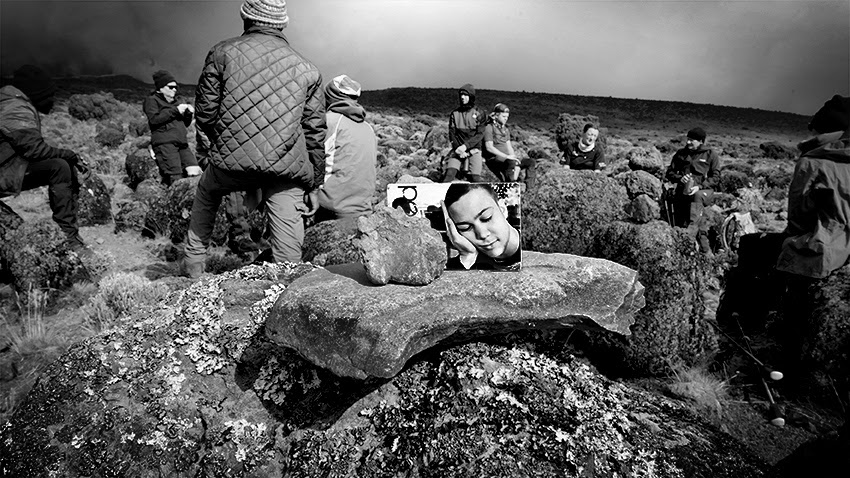
I had a fear, particularly in the early days after Josh died, that over time, our memories would fade, that as the years passed I would forget him, forget what an enormous presence he had been for our family and for all that knew him.
The many photographs we have of him came to the rescue, both as mementos and as material for maintaining an ongoing and loving relationship with him. Symbolic they may be but rephotographing his image in various places on my travels has proved to be an enduring ritual and a source of great comfort.
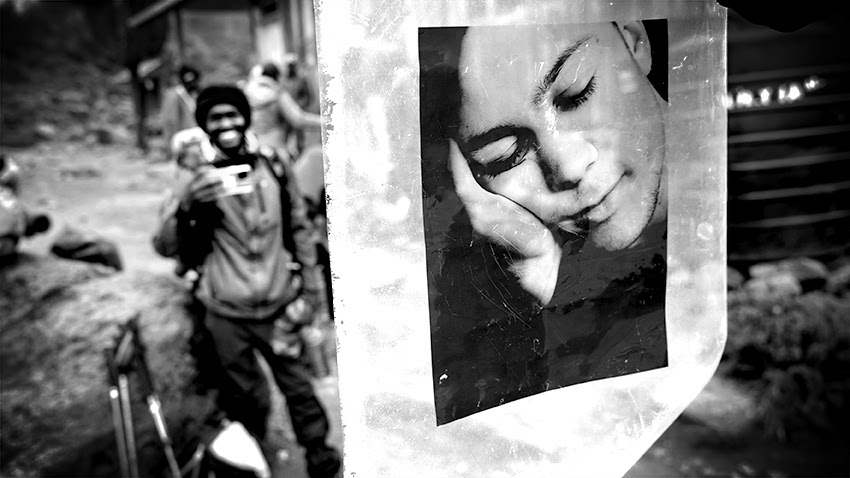
I cannot let that idea go, without the thought that our mountain expedition also served as metaphor for grief. Anyone who has been bereaved will recognise that sense of a continual uphill struggle, arduous, grueling, with so many mood fluctuations, and often containing false horizons.
They will also know that the metaphor works only so far … our challenge to reach the summit of Kilimanjaro has an end point … grief doesn’t.
Grief, especially grief following the death of a child is unending. This is not a bad thing. It just is. At the same time to attain our goal and to stand on the roof of Africa, in a white out, the wind drowning out any intelligent thought, was an achievement to savour.
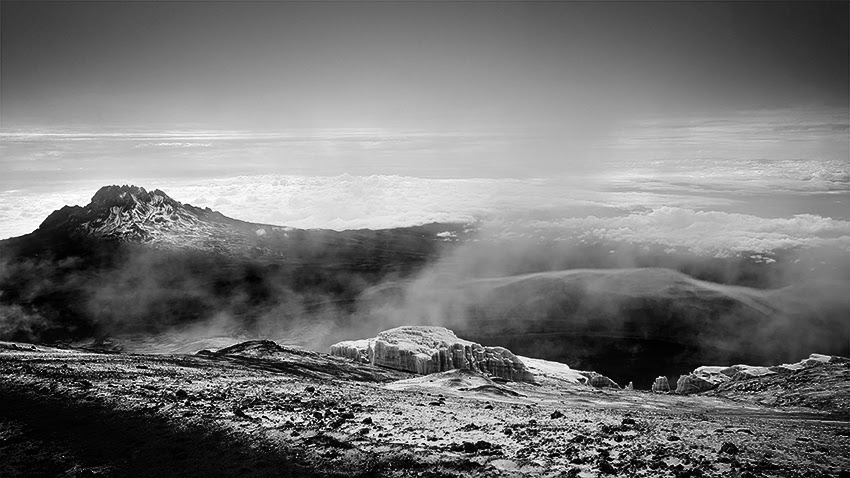
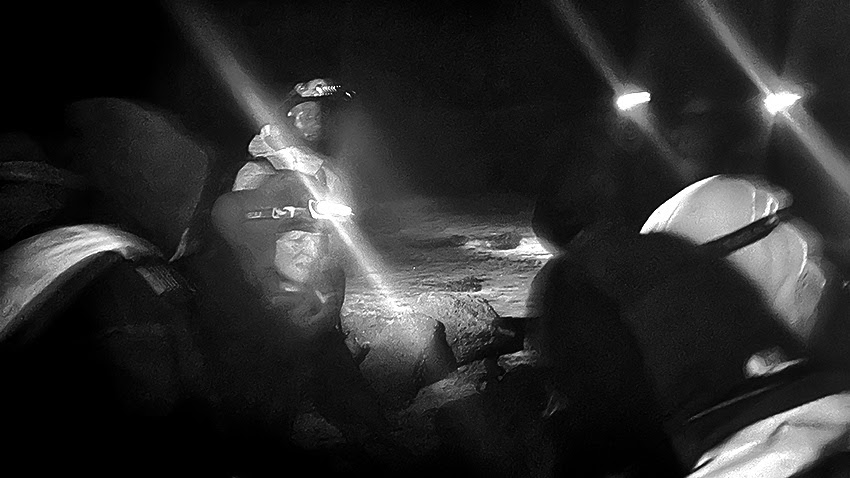

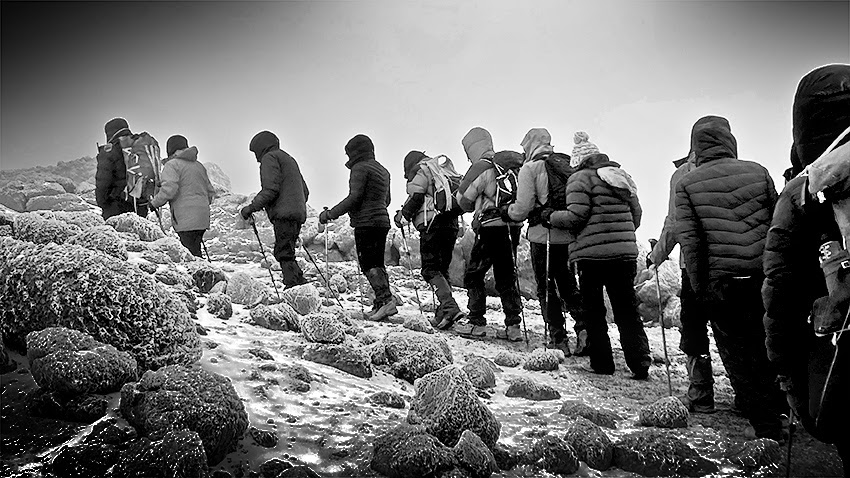

For the next six hours we climbed steadily, zig zagging our way, often over rough ground, often with large rocks and boulders to navigate. There were other parties on the trail and from time to time I would look up to see their lights way above us. So far above us they were but tiny specs in the blackness.
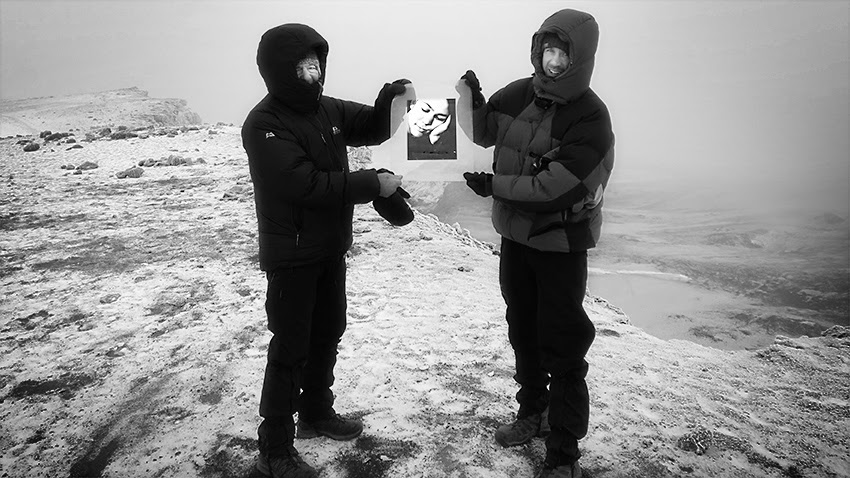

On Wednesday 18th October at approximately 6.30 in the morning, our team of ten climbers summitted Kilimanjaro
Every one of our team had their own reasons to take on this challenge. Over and above a desire to support The Good Grief Project, we’d all carried memories of loved ones now deceased.
For some these were expressed openly, for others it was a more private grief. What was important was the shared sense of the need to honour and commemorate those who we’d lost, to make this moment significant in the way we mourn. I know that I could not have done this alone. None of us would have, none of us wanted that. It was a team effort but one that has undoubtedly helped me progress the story of our ongoing relationship with Josh that is not just about remembrances, not so much about how we were ‘then’, more a celebration of how we are ‘now’.

We are so grateful for all your support. So far donations to the Good Grief Kilimanjaro Challenge have topped £52,000, all of which will help us support bereaved parents and siblings as we help them to find new and creative ways of expressing their grief.
Our ACTIVE GRIEF WEEKEND retreats are our principle means to achieve this but all our work stems from an understanding of grief as an active and creative process, one in which we carry the memory of the deceased in ways that enrich our lives going forward.
“One step at a time” had carried us to the top of Africa. It’s a reminder that perseverance, teamwork, and determination could conquer even the greatest of challenges, not least surviving the death of a child.
With love and good wishes, Jimmy & all at The Good Grief Project

